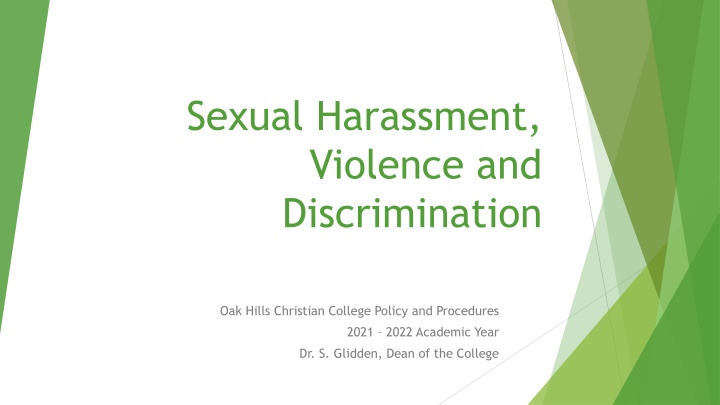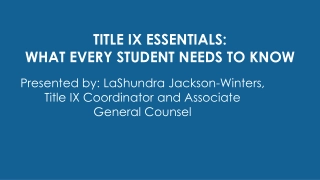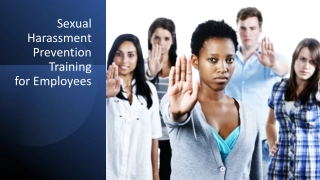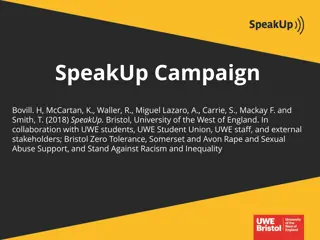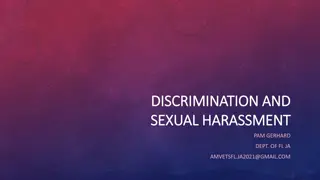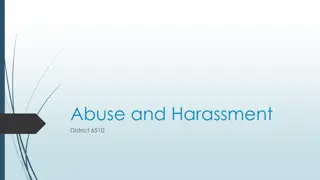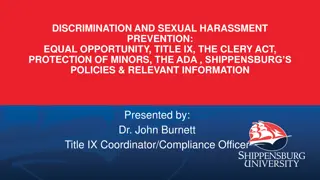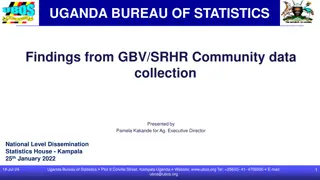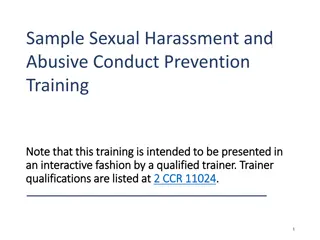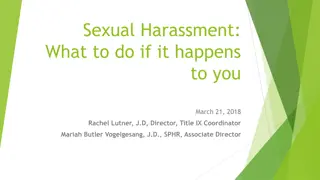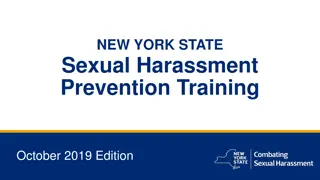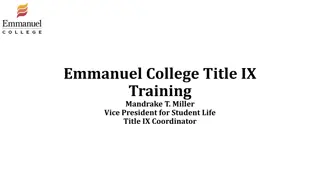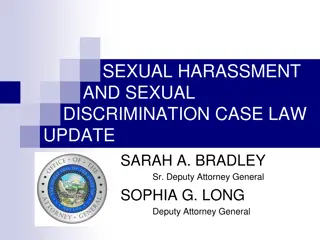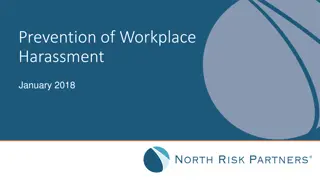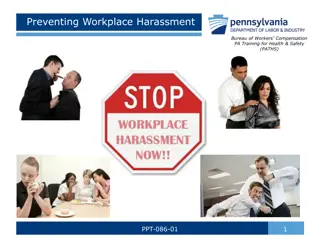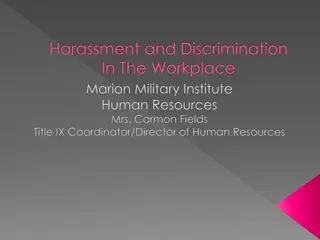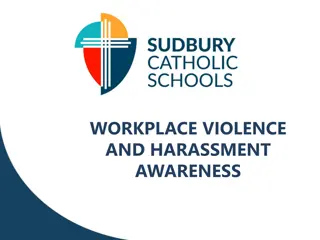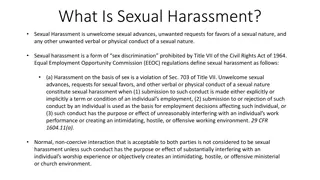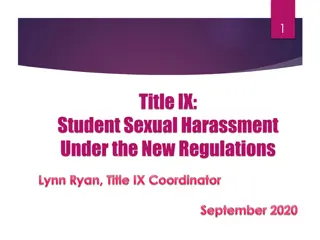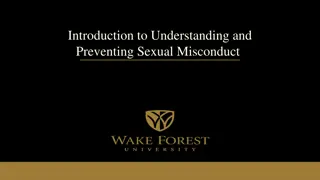OHCC Policy and Procedures on Sexual Harassment, Violence, and Discrimination
This document outlines Oak Hills Christian College's policy and procedures for addressing sexual harassment, violence, and discrimination incidents. It includes information on Title IX responsibilities, outcomes, religious exemption details, and statements on human sexuality and sanctity of human life.
Download Presentation

Please find below an Image/Link to download the presentation.
The content on the website is provided AS IS for your information and personal use only. It may not be sold, licensed, or shared on other websites without obtaining consent from the author.If you encounter any issues during the download, it is possible that the publisher has removed the file from their server.
You are allowed to download the files provided on this website for personal or commercial use, subject to the condition that they are used lawfully. All files are the property of their respective owners.
The content on the website is provided AS IS for your information and personal use only. It may not be sold, licensed, or shared on other websites without obtaining consent from the author.
E N D
Presentation Transcript
Sexual Harassment, Violence and Discrimination Oak Hills Christian College Policy and Procedures 2021 2022 Academic Year Dr. S. Glidden, Dean of the College
Outcomes Understand OHCC responsibilities under the Dept. of Ed. Title IX 2020 Final Rules and 2021 updates Know OHCC policy and procedures regarding sexual harassment, violence or discrimination incidents among students and/or staff. Know your responsibilities regarding reporting sexual violence.
Title IX Department of Education Insures equal access and fairness for men and women with regards to athletics, employment, admissions, financial aid, publications, educational programs, and student rights. Requires a school to promptly respond and investigate sexual harassment and violence. Now includes gender identity and sexual orientation. [OHCC Religious Exemption continues to apply here with the 2021 updates.]
OHCC Religious Exemption In 2016, OHCC requested a religious exemption, specifying the tenets of [our] organization and the provisions of the law or regulation that conflict with those tenets . The U.S. Department of Education s Office for Civil Rights (OCR) granted a very specific and limited exemption in December 2017: Regulations governing admission, preference in admission, recruitment, educational programs and activities, housing, comparable facilities, access to classes, counseling, financial assistance, employment assistance, health and insurance benefits, marital and parental status, athletics, employment Oak Hills Christian College and Associated Ministries Statement on Human Sexuality Oak Hills Fellowship and Associated Ministries Statement on Sanctity of Human Life [S: drive/Everyone/Employee Documents/Guiding Principles Documents] The College is exempt from these provisions to the extent that compliance would conflict with the controlling organization s religious tenets. Exemption from regulatory provisions to the extent that they are interpreted to reach gender identity or sexual orientation discrimination, and to the extent they restrict the College s freedom to apply and enforce the Statement on the Sanctity of Human Life. Please note that this letter should not be construed to grant exemption from the requirements of Title IX and the regulation other than as stated above.
Sanctity of Human Life Statement of Faith (Board of Directors Approved, June 22, 2012) item that speaks to the sanctity of human life. MANKIND: We believe that all human beings are made in the image of God and, therefore, have dignity and worth. We further believe that, through the fall of mankind in Adam, all are sinners by nature and stand in need of regeneration. Statement on the Sanctity of Human Life We believe that all human life is sacred and created by God in His image. Human life is of inestimable worth in all its dimensions, including pre-born babies, the aged, the physically or mentally challenged, and every other stage or condition from conception through natural death. We are therefore called to defend, protect, and value all human life.
OHCC and Associated Ministries Statement on Human Sexuality We will demonstrate civility and compassion as we engage in dialogue with others on these issues. The Bible calls upon us to respect people even though we may disagree with them and even though they may come under discipline for violating Oak Hills community standards for biblical living.
Title IX 2020 Final Regulations: Purpose Intended to effectuate Title IX s prohibition against sex discrimination 1. Obligate institutions to respond promptly and supportively to persons alleged to be victims of sexual harassment 2. Resolve allegations of sexual harassment promptly and accurately under a predictable, fair grievance process that provides due process protections to alleged victims and alleged perpetrators of sexual harassment 3. Effectively implement remedies for victims 4.
Title IX 2020 FINAL REGULATIONS: OVERVIEW OF TOPICS Define conduct constituting sexual harassment Specify what triggers a college s legal obligation to respond Conditions that activate a school s obligation to respond to a report of sexual harassment Circumstances when a school must initiate its grievance process Specify how a school must respond Set forth mandatory steps that the college must take as part of every response to sexual harassment Establish required grievance process
OHCC Responses to Title IX and Sexual Harassment Issues Policy I. Procedures II. Notification/Report Responsible Authorities/ Reporting Supportive Measures Formal Complaint and Grievance Procedures Definitions ~ Who is involved Informal Resolution Investigation Live Hearing Appeal
The broader policy of OHCC Oak Hills Christian College will not tolerate any physical or verbal threats, intimidation, hazing, assault, or violence against another person on the basis of race, color, national or ethnic origin, sex, disability, age, status with regard to public assistance or other applicable protected class status. Such conduct is grounds for immediate disciplinary action, including dismissal, termination, fines, or arrest. Within this, are the philosophy and standards practiced by Oak Hills Christian College in regards to sexual discrimination, harassment, assault and any other unwelcome conduct based on sex. This policy complies with the federal Department of Education 2020 Final Title IX Rules. In the event that the final result of the formal grievance process determines that a complaint does not constitute sexual discrimination or harassment under Title IX rules, Oak Hills Christian College maintains the right to further action based upon provisions in the college s code of conduct for students and employees. The Title IX framework is applicable to both students and employees.
Title IX Definitions of Sexual Harassment Quid pro quo sexual harassment by employees 1. Misconduct on the basis of sex that jeopardizes a student s right to or deprives a student of equal access to education Misconduct using the submission to or rejection of sexual advances, requests, or demands by an individual as a basis for academic decisions Misconduct on the basis of sex that explicitly or implicitly makes submission to such conduct a term or condition of an individual s employment/student status. Sexual assault, dating violence, domestic violence, and stalking as defined by the Clery Act. [See definitions at the U.S. Department of Education, Campus Safety and Security site https://ope.ed.gov/campussafety/#/ under Dictionary.] 2. Any other unwelcome conduct determined by a reasonable person to be so severe, pervasive, and objectively offensive that it denies a person access to the college s education program or activity (hostile environment) . 3.
Level 1 Notification/Report Notifying the Title IX Coordinator does not constitute a formal complaint against the individual who has been reported to have committed harassment. WHAT TO DO IF YOU HAVE EXPERIENCED HARASSMENT OR ASSAULT A report to the Title IX Coordinator who has authority to act on behalf of the college is the basis upon which the college has official knowledge of harassment Talk to someone you trust for support. The Title IX Coordinator, the Dean of Students, and the President are the sole persons with authority to institute corrective measures. Notify the Title IX Coordinator and/or the Dean of Students. Any employee, student or person engaged in the college programs and activities (e,g. residing or present on OHF locations) with knowledge of a sexual discrimination or harassment of any nature must notify the Title IX Coordinator or the Dean of Students (if student involvement).
Level 1 Notification/Report: What to expect Confidentiality will be maintained as long as it does not impair the ability of the college to provide measures The Title IX Coordinator will: respond promptly no disciplinary or punitive actions can be taken against an alleged perpetrator of harassment or assault without following the grievance process meet with you confidentially to discuss supportive measures arrange to provide these supportive measures discuss with you information regarding further actions which may be taken. the college reserves the right to independently initiate a formal grievance process when the safety of other persons may be at risk
Level 2 Making a Formal Complaint A formal complaint is made by the submission in writing of complete documentation of an alleged sexual harassment incident(s) to the Title IX Coordinator. The Title IX Coordinator will initiate the grievance process in order to provide a prompt and equitable resolution of student and employee complaints. Documentation must include: date(s) and time(s) of the alleged incident(s) location and people involved in the alleged incident(s) specific details of what happened and resulting effects related to the incident(s) any action taken following the incident(s) physical or digital signature of the complainant
Level 2 The Grievance Process An Investigation 1. A Live Hearing 2. A Determination of Responsibility and Measures to Take 3. The Possibility of an Appeal 4. Review Board of any Appeal 5. Conclusions 6. At any point prior to or during the process: possibility of informal resolution process under specific conditions 7.
Level 2 The Investigation Investigators: The Title IX Coordinator will appoint two or more investigators Must not have a conflict of interest or have a bias for or against any party involved Each party will have advisors with them throughout the process. Must be fair and equitable to all parties in the entire process The investigation team will interview both the complainant (accuser), the respondent (accused), and witnesses. Must assume the respondent non- responsible during the investigation process The investigation team will prepare a report of the evidence they have collected. Must understand what is relevant in terms of evidence
Level 2 The Live Hearing The Decision-maker Cannot be the Title IX Coordinator, any of the investigators, or any party involved in the investigation (complainant, respondent, advisors, witnesses) The Live Hearing allows the advisors of both the complainant and the respondent to ask questions and cross-examine the other party and witnesses under the supervision of a decision-maker. No conflict of interest or bias Will read the investigative report and lead the live hearing. Can be in separate room with technology connected them Will determine the result of the grievance process and any disciplinary sanctions and new or continued supportive measures. Is recorded Deals only with relevant evidence
Level 2 An Appeal and a Review Board The Title IX Coordinator will appoint a review board of four OHF members (both genders) to review the investigation report, process, and findings of the live hearing. Either the complainant or the respondent may appeal if they are not in agreement with the final determination of the decision- maker. If they see a procedural irregularity in the grievance process that affected the outcome. The review board will uphold the findings of the decision- maker or recommend a modified or alternate conclusion. If there is new evidence not reasonably available earlier The final decision is communicated to all parties and the college will implement the decision. If they allege conflict of interest or bias in the Title IX Coordinator, investigation team or decision-maker.
Level 1 and 2 NO RETALIATION No retaliatory action will be taken against any person who in good faith reports conduct that he or she believes may violate this policy. No retaliatory action will be taken against any individual for assisting or participating in an investigation, proceeding or hearing related to a harassment complaint. Any person who violates these provisions may be subject to discipline, up to and including termination of employment or student status.
Local Resources On Campus 218-751-8670 Title IX Coordinator (Dr. Glidden) 218-333-1959 Dean of Student Life (Ron Maixner) 218-407-3865 Associate Dean of Student Life (Kierlyn Fritz) 218-308- 3302 Security Director (Brad DeJager) 218-556-1224 Port-O-Wild s Security Services 218-759-7615 or 218-766-9614
Local Resources Off Campus Bemidji Police Department 911 Bemidji Police Non-Emergency 218-333-9111 Sanford Regional Hospital 218-751-5430 Support Within Reach 218-444-9524 or 1-800-708-2727 Evergreen Community Services 218-751-8223
Reference Documents Federal Register/Vol. 85, No. 97/Tuesday, May 19, 2020/Rules and Regulations. Accessed July 18, 2020 at https://www.govinfo.gov/content/pkg/FR-2020-05- 19/pdf/2020-10512.pdf Summary of Major Provisions of the Department of Education s Title IX Final Rule, pp. 1-9. Accessed July 15-20 at https://www2.ed.gov/about/offices/list/ocr/docs/titleix- summary.pdf National Association of Independent Colleges and Universities (NAICU) Executive Summary of Final Title IX Rules. PDF. Accessible at http://www.naicu.edu/issues- advocacy/title-ix-regulations-update National Association of Independent Colleges and Universities (NAICU) Technical Summary of Final Title IX Rules, May 11, 2020. PDF. Accessible at http://www.naicu.edu/issues-advocacy/title-ix-regulations-update Nash, Kathryn and Emily Mawer. Webinar from trainED (Lathrop GPM), Minnesota Office of Higher Education Title IX Training. June 2020. Executive Order 14021 of March 8, 2021 Office of Civil Rights April 6, 2021 letter to students, educators and other stakeholders. Question and Answers on the Title IX Regulations on Sexual Harassment (July 2021)
Investigator/Decision-maker Training Module In addition to careful review of the general training information above, all investigators and decision-makers should master the following information. Completion of this training module should be reported directly to the Title IX Coordinator.
General Facts to Bear in Mind Institutions with actual knowledge of sexual harassment (i.e. a person with authority to act has been notified) in an education program or activity are required to respond to complaints of harassment in a manner that is not deliberately indifferent. Deliberate indifference is defined as a response to sexual harassment that is clearly unreasonable in light of the known circumstances. An institution s treatment of both victims and accused students may constitute discrimination on the basis of sex under Title IX.
Required Characteristics and Behaviors for Investigators and the Decision-Maker 1 Diligently and consistently avoid any conflict of interest Diligently avoid any bias toward the complainant(s) and the respondents(s) and toward the process itself Be aware of and diligently avoid relying on sexual stereotypes Be prompt in progressing through the grievance process
Required Characteristics and Behaviors for Investigators and the Decision-Maker 2 Concerning Evidence: Include an objective evaluation of all relevant evidence, including inculpatory and exculpatory evidence (supporting guilt or innocence of the respondent) Maintain carefully the presumption that the respondent is not responsible until the entire grievance process is done Seek prior written consent before requesting confidential medical information; do not make assumptions if such consent is not given. Lack of consent cannot be the sole basis for any final determination of responsibility. Preserve all parties legally recognized rights, unless these are waived. Title IX processes do not supersede the Constitution. Understand and maintain the clear and convincing evidence standard.
Required Characteristics and Behaviors 3 The Title IX Coordinator will make an initial assessment of the risk to the health and safety of a student or other individual. Investigators may also assess and determine that an immediate risk is involved. Is such case, a student may be removed from campus, provided a notice and an opportunity to respond is given. Likewise, an employee may be be placed on administrative leave. Failure to maintain these characteristics and behaviors during the grievance process on the part of any person with authority to act (Title IX Coordinator, Dean of Students or President), the investigators, or the decision-maker are grounds for an appeal.
The Investigative Phase 1 Institutions are required to follow the grievance process for conduct set forth in a formal complaint. Unless an informal resolution is agreed upon and concluded, allegations of sexual harassment will lead to investigations of allegations. Institutions must dismiss formal complaints alleging conduct if any of the following conditions are not met: Does not meet the definition of sexual harassment 1. Has not occurred within the institution s educational program or activity 2. Did not occur against a person in the United States 3. Institutions may dismiss formal complaints if any of the following conditions occur: The victim withdraws the complaint 1. The accused individual is no longer a student or employee at the institution 2. Circumstances prevent the institution from gathering sufficient evidence to reach a determination 3. (NAICU Title IX Technical Summary, Pg. 5)
The Investigative Phase 2 During the investigation: The investigators assume the responsibility for gathering evidence. Both parties must have equal opportunity to present witnesses. Both parties must have opportunity to have their advisor accompany them to proceedings, but their participation may be limited. (NAICU Title IX Technical Summary, Pg. 5)
The Investigative Phase 3 Provide equal access to the evidence and the chance to respond to such evidence. Provide written notice and time to prepare for any meetings. Allow delays in the investigation for a good reason (absence of parties, law enforcement activity, etc.) Disclose all evidence, even if not relied on for reaching a determination. Produce the investigative report and provide it to both parties for review and written response. (NAICU Title IX Technical Summary, Pg. 5)
The Decision-Maker and the Live Hearing 1 The role and responsibilities of the Decision-Maker: Read and evaluate the investigative report and any written responses from either party. Obtain a written list of requested witnesses from both parties and establish that they are relevant based on knowledge of the person requesting them or events in the allegation. Schedule a live hearing, following guidelines for notifications to all parties, including witnesses. Schedule the room(s) and technology needed for the hearing. Either party may request the hearing to occur with parties in separate rooms. Prepare the means to audio record the hearing and make it available to both parties following the hearing.
The Decision-Maker and the Live Hearing 2 Lead the live hearing, allowing the advisors for both parties to ask relevant questions and cross-examine the other party and witnesses. Determine for each question and each cross-examine whether the question is relevant and provide a reason if a question is excluded. Questions and cross-examination may not include questions about the complainant s sexual behavior or disposition, unless offered to establish consent or demonstrate that a person other than the respondent is responsible for committing the alleged violation. Do not take into consideration statements made by a party or witness who does not submit to cross-examination. Evaluate evidence based on the clear and convincing standard.
The Decision-Maker and the Live Hearing 3 The Decision-Maker must prepare a final written determination of responsibility regarding the complaint, including the sanctions and remedies to be implemented. The written report should be given to the Title IX Coordiantor and both parties. The report should include information on when, how and on what basis an appeal may be made. Written records and the audio recording of the hearing will be kept by the college for seven years.
Conclusion The documents used for reference in establishing the college s policy and procedures for dealing with sexual harassment are a good source for researching any further questions. The Title IX Coordinator can also assist and research further any questions that arise.
